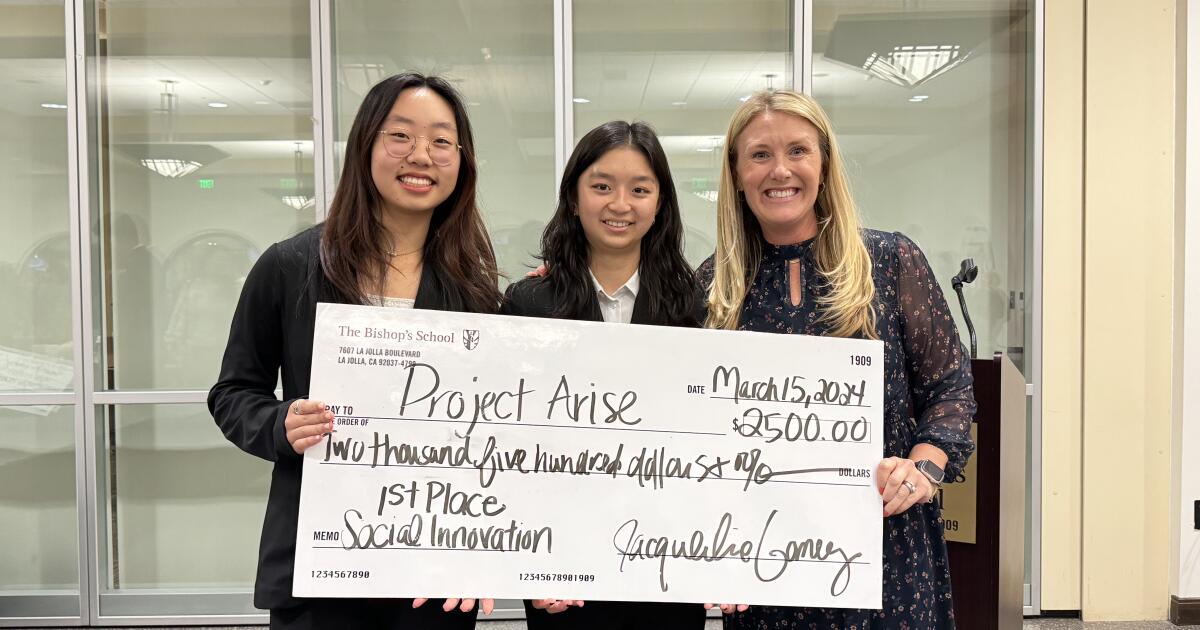Bishop's School students win Social Innovation Challenge with AI algorithm that identifies invasive plants
Sophomores Sophie Zeng and Grace Yao say their project can help alleviate wildfires and other negative effects of invasive plants by aiding people in removing them. Sophomores Sophie Zeng and Grace Yao of The Bishop's School in La Jolla have won the school's Social Innovation Challenge with Project ARISE, an artificial intelligence algorithm and app designed to help citizen scientists identify invasive plants. The challenge, now in its fourth year, tasks students with identifying a real-world problem, developing an innovative solution and pitching the idea to potential investors. The students initially intended to address the issue of wildfires but found that invasive plants are one of the most overlooked causes of wildfires. They created an app with an AI algorithm that could classify the most invasive plants and has a 90 percent accuracy rate. For their win, the students received $2,500 to help shepherd the project forward.

게시됨 : 2 달전 ~에 의해 Ashley Mackin-Solomon ~에 Tech
Aiming to solve a problem literally from the ground up, sophomores Sophie Zeng and Grace Yao of The Bishop’s School in La Jolla recently won the school’s Social Innovation Challenge with Project ARISE, an artificial intelligence algorithm and app designed to help citizen scientists identify invasive plants so they can be removed.
The Social Innovation Challenge, now in its fourth year, tasks students with identifying a real-world problem, developing an innovative solution and pitching the idea to possible investors. As part of the challenge, the students were asked to interview professionals in the field to get a full understanding of the issue.
Originally intending to address the issue of wildfires, Sophie and Grace spoke with conservation specialists, environmental science teachers and park rangers and learned there was another hurdle to consider.
“In California, we are really drought-prone, so we have a lot of wildfires, but they have been getting worse and harder to control,” Grace said. “So we were looking into that and realized that invasive plants are one of the most overlooked causes of wildfires because a lot of invasive plants finish their life cycle before native plants. So by the time wildfire season comes around, they are already dead and dried on the ground. They serve as pure fuel.
“No one has really been working on mitigating that in the public eye, so we wanted to combine that issue with our love of computer science with this project.”
The project’s name, ARISE, is an acronym for AI-Assisted Removal of Invasive Species for Environmental restoration.
“With this app we want to increase the number of volunteers and citizens out there that can help remove invasive plants,” Sophie said. “The experts we spoke to all agreed that one of the bigger issues is lack of awareness and lack of initiative. So by putting this knowledge in their hands, we’re aiming to mobilize the masses and have more people out there helping remove invasive plants and mitigate some of the negative issues they can cause.”
Invasive plants can have ramifications for everything from the food chain to public utilities, she said. But without knowledge or training, an everyday volunteer might not know which plants to remove and which ones to keep.
So Grace and Sophie set out to create an app with an AI algorithm that could classify the most invasive plants. It was designed so someone could scan the surroundings and positively identify which plants should be removed.
The algorithm now has a 90 percent accuracy rate, they said, but getting there took a big effort.
“At a certain point, we hit an accuracy plateau with our model at around 40 percent and we had to get it back up,” Sophie said.
Bishop’s School computer teacher Marcus Jaiclin “pointed us toward things we hadn’t tested and how to widen the scope,” she said. “We realized there was so much we hadn’t tested. So instead of doing most of the research on invasive plants … we started to do more and more research on AI and machine learning. That helped us a lot.”
Sophie and Grace spent their spring break from school integrating the algorithm into the app. They also plan to expand the scope so it can recognize more types of plants.
“Throughout the process I think we made some really meaningful connections that will hopefully mean partnerships so we can expand the reach of the project,” Grace said.
For winning the Social Innovation Challenge, the two received $2,500 to help shepherd the project forward. ◆
주제: Christianity, AI
